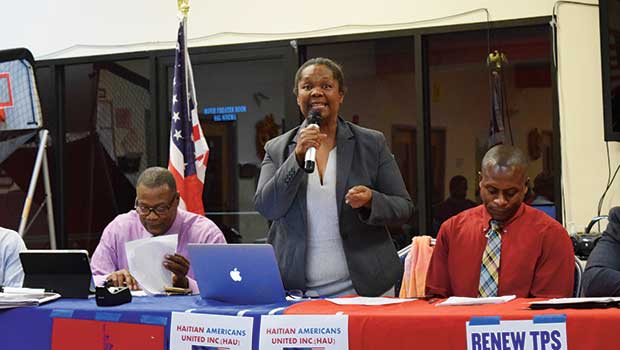Haitian TPS-holders face deportation
Activists prepare to fight DHS decision

The U.S. Department of Homeland Security last week terminated the Temporary Protected Status of about 58,000 Haitian TPS-holders residing in the US, including an estimated 5,000 currently living and working in Massachusetts, and granted them an 18-month period to prepare for their return.
Haitian-Americans United Inc., a Mattapan-based non-profit organization, held an emergency press conference last Tuesday, a day after the decision was announced, at the Kay Pam Community Center in Dorchester. Activists, allies and politicians expressed their disagreement with DHS’ assessment of conditions in Haiti to justify the return of Haitian immigrants.
HAU chairman Rev. Dieufort Fleurissaint said, “While we understand that Acting DHS Secretary Elaine Duke took the time to listen to various testimonies and to stakeholders, we also believe that there are larger immigration policy issues that still need more in-depth assessment.”
The DHS identifies several conditions for which Temporary Protected Status is granted: ongoing armed conflict, an environmental disaster, an epidemic — or any other “extraordinary and temporary conditions.”
Haiti is still dealing with the aftereffects of a 2010 earthquake, Hurricane Matthew in 2016, and a cholera epidemic.
Wadner Oge, a Boston attorney, offered legal insight on the situation at the press conference.
“This is not the end of it,” he said about the DHS decision. “It’s the beginning of the fight.”
Oge said the best strategy to fight the decision will be for TPS recipients to pursue multiple paths towards gaining legal permanent residency, and “at the same time, we need to organize the movement to get Congress to act.”
There have been a number of bills proposed recently by members of Congress to protect TPS recipients from deportation.
The American Promise Act of 2017 was introduced on Nov. 3 by Rep. Nydia Velazquez (D-NY).
On Nov. 14, Rep. Yvette Clarke (D-NY) sponsored the Act to Sustain the Protection of Immigrant Residents Earned through TPS Act of 2017, or simply the ASPIRE-TPS Act of 2017.
And then there’s the SECURE Act, or the Safe Environment from Countries under Repression and in Emergency Act, proposed by Maryland Democratic Senators Chris Van Hollen and Ben Cardin on Nov. 16. The bill would make immigrants with TPS eligible to apply for legal permanent residency after three years.
“We’re going to switch the narrative: these people are here, they pay taxes, they have kids, they work in every profession and they are the fabric of the community,” said Oge.
Geralde Gabeau, executive director of Immigrant Family Services Institute, said that TPS holders in the U.S. are parents of over 275,000 children.
“We are very concerned about breaking families up,” she said.
“Haiti is in a situation that makes it difficult for people to return and live in,” she added, “and the country is not ready to handle the return of all 58,000 Haitians. Their infrastructure is too weak.”
Holden Pierre, a 24-year-old TPS beneficiary, shared his personal story of coming to the U.S. from Haiti at 7 years old with his mother. “TPS has allowed me to work and get involved in my community, mentoring other young men,” he said.
Pierre said he looks after his younger siblings, who are U.S. citizens.
“Their dreams can fall apart if my mom and myself are not there to support them,” he said.
“My mom, since she has been here, has worked hard for 10 or 15 years to have the American Dream of buying a home,” Pierre added. “What’s going to happen to her home?”
Also showing their solidarity with HAU at the press meeting were Patricia Montes from Centro Presente, the Latin American immigrant organization, and Roxana Rivera, vice president of the 32BJ SEIU labor union.
“It is our responsibility and obligation to work with you,” said Montes. “Centro Presente represents over 1,000 people from El Salvador and Honduras who have renewed TPS for the past 20 years.”
Montes said the nonprofit would extend the same type of support for Haitian TPS holders.
Said Rivera, “We will work with you to make sure there is a permanent solution for the folks who contribute to the day-to-day life of our state in various service industries.”
HAU is planning to host another rally to support Haitian TPS holders on Jan. 10, 2018.






